Monthly Topic Briefs
Updates on current issues and projects.
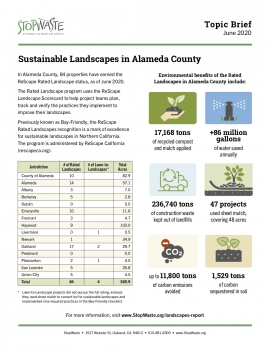
In Alameda County, 84 properties have earned the ReScape California Rated Landscape status, as of June 2020.
The program scorecard helps project teams plan, track and verify the practices they implement to improve their landscapes.

Soil is a living ecosystem – a single tablespoon can contain billions of organisms. The healthier our soil, the more resilient our gardens, landscapes and farmlands are. Utilizing compost is the simplest way to create a beneficial environment for growing healthy, disease resistant plants.
Using compost:

Single-use wet wipes – baby, disinfectant, disposable – are ubiquitous in our society. Right now, people are using wet wipes in record numbers because of sanitation concerns and toilet paper shortages due to the COVID-19 crisis.
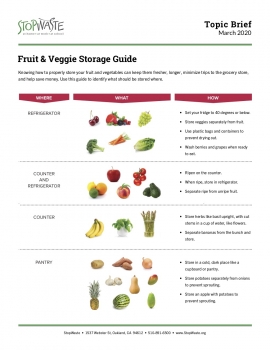
Knowing how to properly store your fruit and vegetables can keep them fresher, longer, minimize trips to the grocery store, and help save money. Use this guide to identify what should be stored where.
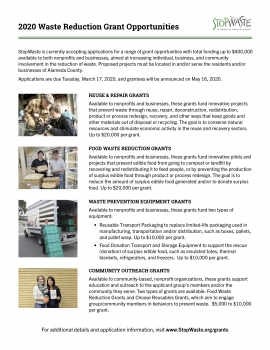
StopWaste is currently accepting applications for a range of grant opportunities with total funding up to $400k available to both nonprofits and businesses, aimed at increasing individual, business, and community involvement in the reduction of waste. Proposed projects must be located in and/or serve the residents and/or businesses of Alameda County.

California state law requires that each county adopt a County Integrated Waste Management Plan (CoIWMP) that serves as a roadmap to approaching countywide solid waste and recycling issues, including landfill needs.
PFAS, or per- and polyfluoroalkyl substances, are a class of man-made chemicals used in a variety of consumer goods that can persist in the environment indefinitely (earning them the nickname “forever chemicals”). PFAS and are used in everyday products such as nonstick cookware, water resistant clothing, and even dental floss and cosmetics. More recently, manufacturers are utiliz
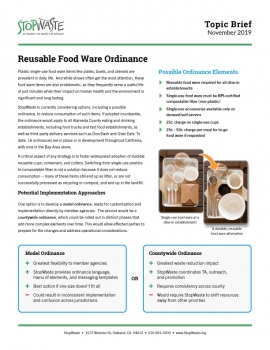
Plastic single-use food ware items like plates, bowls, and utensils are prevalent in daily life. And while straws often get the most attention, these food ware items are also problematic, as they frequently serve a useful life of just minutes while their impact on human health and the environment is significant and long lasting.
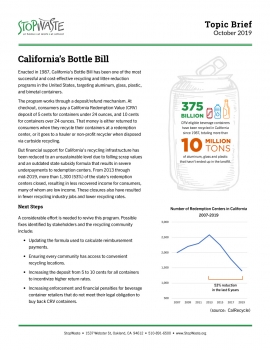
Enacted in 1987, California's Bottle Bill has been one of the most successful and cost-effective recycling and litter-reduction programs in the United States, targeting aluminum, glass, plastic, and bimetal containers. But financial support for California's recycling infrastructure has been reduced to an unsustainable level due to falling scrap values and an outdated state subsidy formula
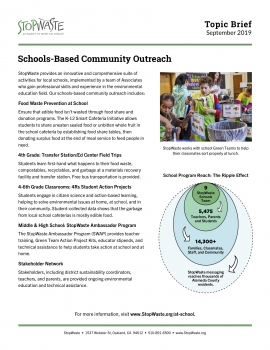
StopWaste provides an innovative and comprehensive suite of activities for local schools, implemented by a team of Associates who gain professional skills and experience in the environmental education field.
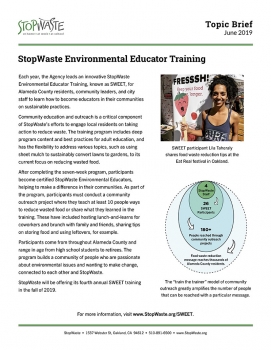
Each year, the Agency leads an innovative StopWaste Environmental Educator Training, known as SWEET, for Alameda County residents, community leaders, and city staff to learn how to become educators in their communities on sustainable practices. Community education and outreach is a critical component of StopWaste’s efforts to engage local residents on taking action to reduce waste.
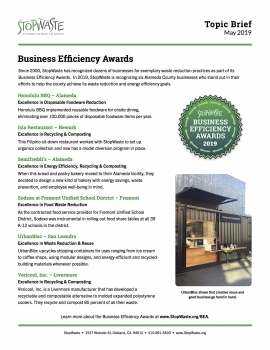
Since 2000, StopWaste has recognized dozens of businesses for exemplary waste reduction practices as part of its Business Efficiency Awards. In 2019, StopWaste is recognizing six Alameda County businesses who stand out in their efforts to help the county achieve its waste reduction and energy efficiency goals.